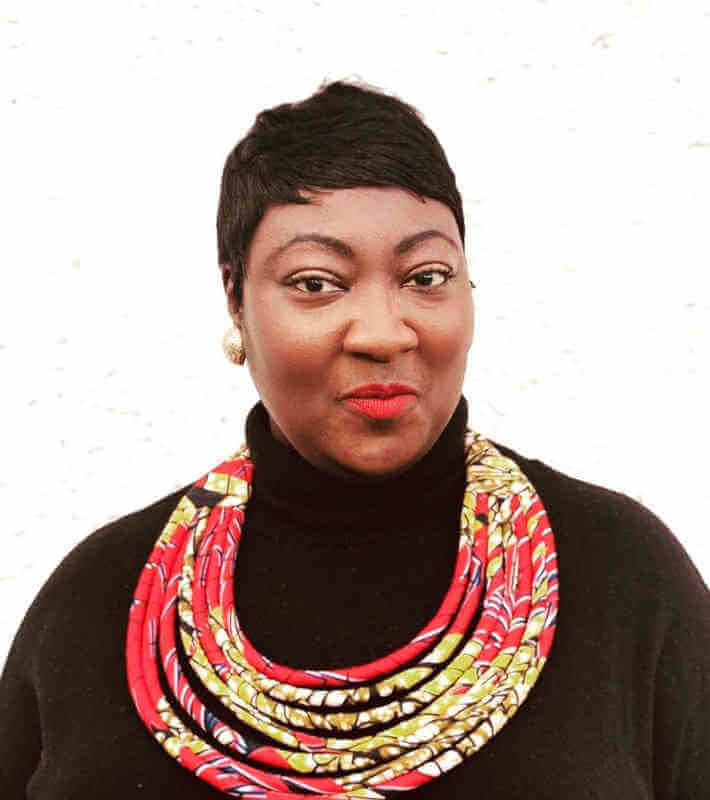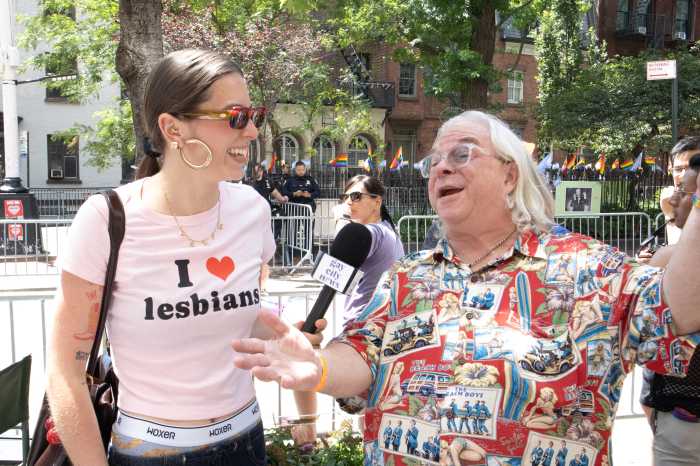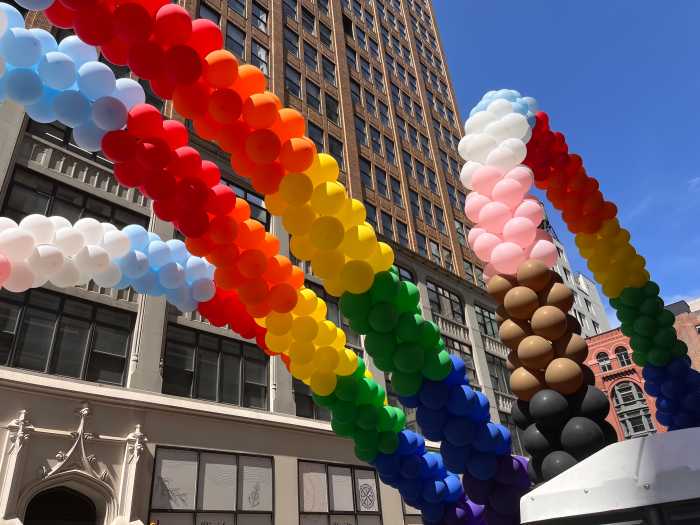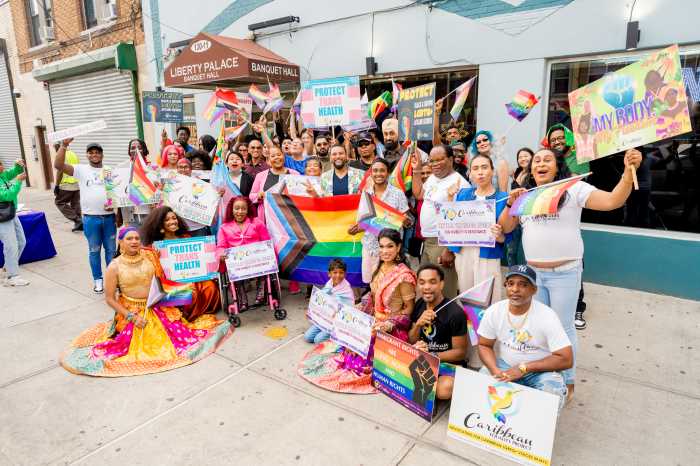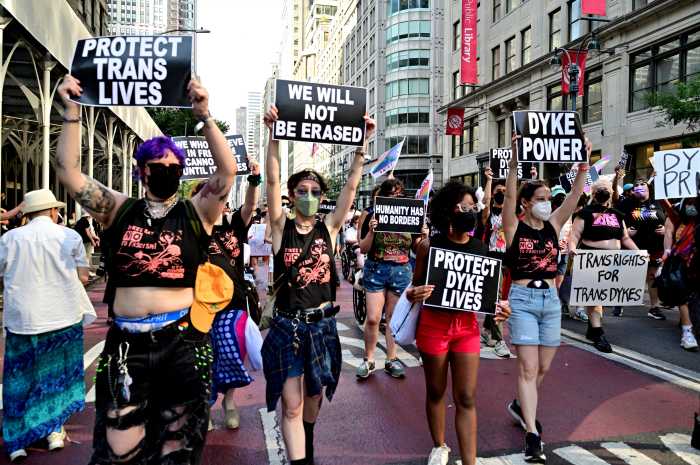As WorldPride bloomed in New York City, UK Black Pride co-founder Phyllis Akua Opoku-Gyimah, better known as Lady Phyll — an out lesbian grand marshal in the June 30 march — cast a bright light on international injustices and invoking historical figures outside her home country to illustrate the global struggle for racial equality in the LGBTQ community.
“In the words of Audre Lorde, ‘There is no such thing as a single-issue struggle because we do not live single-issue lives,’“ said Phyll of the late poet, writer, and activist from New York City who, in a speech at the 1979 National March on Washington for Lesbian and Gay Rights, said, “We cannot separate our oppressions, nor yet are they the same.”
Phyll has long played a role in pushing for civil rights in the UK, where she famously rejected an honorary Member of the Most Excellent Order of the British Empire — or MBE — rank to make a bold statement about her country’s role in colonizing Africa and imposing laws there that continue to hold back LGBTQ rights to this day.
Perhaps her most impactful work as a queer activist came in 2005 when she was leading an organization known as Black Lesbians in the UK. That group embarked on a bus trip to Southend-on-Sea, a coastal town east of London, where they sought to briefly escape the racism, sexism, and homophobia they endured in their day-to-day lives. That trip led to the creation of UK Black Pride the following year, which planted the seed for others to launch Black Pride events around the world in following years.
“We haven’t looked back [since then],” Phyll told Gay City News in an email interview just days before WorldPride and Stonewall 50. “It’s really a political movement because our lives are political.”
At its core, Phyll said, UK Black Pride represents a safe space where folks can celebrate diverse sexualities, gender identities and expressions, cultures, and backgrounds while also honoring black and LGBTQ culture through education, arts, cultural events, and advocacy.
“Importantly, UK Black Pride promotes unity and cooperation among LGBTQ people of diasporic communities in the UK, as well as their friends and families,” Phyll said.
Even as Black Pride celebrations spread to different parts of the world, Lady Phyll is mindful of the deep history of the intersection of race and LGBTQ justice — and how that history predates existing Black Pride events.
“It’s important that we’re always very clear that there were Black Prides before UK Black Pride,” she explained. “They may not have been called Black Pride, but they did the life-giving work of creating spaces and moments for our communities to feel safe, welcome, and wanted. The creation of UK Black Pride was in direct response to a lack of visibility and real meaningful inclusion in mainstream Pride organizations, which are often built using the same structures and hierarchies from which we’re trying to escape.”
She continued, “In the Black communities, grassroots interventions have always had such far-reaching impact. I think UK Black Pride continues on in the spirit of all those who laid the foundations for us to build something as momentous as UK Black Pride. And to be frank, unless we dismantle patriarchy, we’re always going to have a need for Black Pride, for Trans Pride, for Disabled Pride, you name it.”
Phyll is continuing her work in the broader, global campaign for justice in the LGBTQ community through her new position as the executive director of the Kaleidoscope Trust, which she starts in August. The organization fights for LGBTQ rights in nations where those rights are nonexistent or folks continue to face discrimination for their sexual orientation or gender identity.
Some nations formerly occupied by the British have gradually started to roll back the centuries-old laws against LGBTQ rights, but those advancements represent only a fraction of the long list of nations still enforcing penalties today. And even in places where anti-LGBTQ laws have been scrapped, it will take time and effort to unravel the homophobic and transphobic attitudes that built up during those eras. Lady Phyll wants to continue chipping away at the long-term effects of colonization through her new role.
“Kaleidoscope Trust empowers the on-the-ground activists and gives them the money and resources they tell Kaleidoscope they need to help shift the dynamic around a specific hurdle,” she said. “We then go move through the corridors of power, among funding bodies and in spaces Black and Brown activists are not often granted access to in order to secure those resources and get them to the people who need them,” she explained.
Lady Phyll’s engagement on LGBTQ rights on an international level gives her a special perspective of the meaning of WorldPride. She viewed the celebration in New York as a “momentous recognition” that the fight for queer rights is a global one that transcends borders and spans across oceans worldwide. And although her work is centered on addressing the lingering injustices facing the intersectional queer community, she believes that it is equally important to appreciate living as out LGBTQ people.
In other words, Lady Phyll planned to have fun and make connections in New York at WorldPride. She sought to meet as many people as she could, engage in conversations, connect with queer black sisters and brothers, and learn more about what’s happening with the local LGBTQ community here.
“So much of our lives as queer, transgender, and intersex people of color is in opposition to others or in defense of our humanity,” she said. “It feels important to recognize that our lives are also about those celebratory moments, when we come together to embrace each other, to say, ‘I see you,’ and to share in that collective joy together. We will get where we need to go if we do this together, if we fight for each other, and if we remember the global community of LGBTQ people who are working hard for their freedoms. There is so much to celebrated.”

